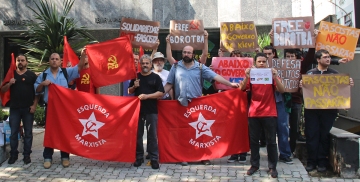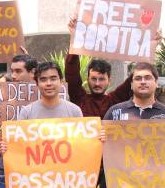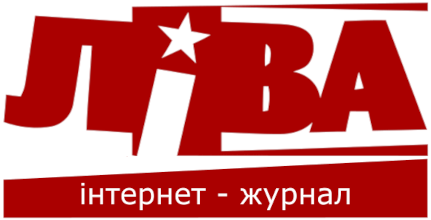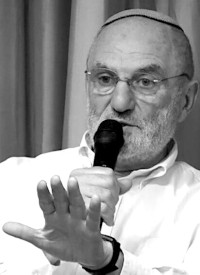
The Brazilian Communist Party and Esquerda Marxista have followed with concern the developments in Ukraine. It is yet another chapter of imperialist intervention in the country and of struggle between factions of oligarchs of the kind that have marked the history of Ukraine after the breakup of the USSR. These oligarchs emerged as a dominant group after having taken over, through shady manoeuvres and privatizations, the achievements built with much sacrifice by the Soviet people. Their actions have brought the country to its current state, on the verge of economic and social bankruptcy.
As in the so-called “Orange Revolution” of 2004, the pro-American and pro-European faction of oligarchs overthrew the government of the other section that is closely linked to Russian capitalism. This was only possible because the government of Victor Yanukovych was corrupt and authoritarian. His policy of centralizing political and economic power around his family not only pushed the oligarchs to abandon him and to join the opposition in favour of a rapprochement with the EU to ensure their privileges, but it also generated discontent among the people.
With the financial resources of Western imperialism and their control over the media, the opposition and their fascist groups managed to channel the popular dissatisfaction in the western part of Ukraine for the coup d’état, winning over the public opinion of that part of the country to support the Association Treaty with the EU, despite the fact that this agreement in reality involved deindustrialization, mass unemployment, a fall in wages, and the worsening of the standards of living for the workers.
The fascist militias were fundamental for the victory of the opposition oligarchs. They were responsible, through the manipulation of facts, of attacking militants of the opposition itself and of using snipers against the demonstrations to reject the offer made by the Russian government and to justify their violent tactics, being directly to blame for the bloodshed in Kiev.
Worried about the possibility of losing control over the process, the European imperialists later struck up a deal with the Russian government and the Yanukovych government and announced on the 21st of February an agreement that envisioned a coalition government, early elections, and a return to the 2004 constitution, reducing thus the presidential powers.
In the meantime, the far right and their fascist militias, directly connected to the American government, carried out a coup on the following day, ejecting Yanukovych from power. In this way different interests converged: the concern of the Americans to stop a rapprochement between Berlin and Moscow and craving for power of the fascists. With Washington’s blessings and for the first time since the defeat of Nazi-fascism in the Second World War, a classical fascist party participated in a government in Kiev. The new interim government started its escalation of violence, restricting the use of the Russian language, persecuting left-wing parties and the party of the former president, mostly based in the east and the south of the country, areas largely inhabited by ethnic Russians.
The fascists of Svoboda and the Right Sector took over the main positions in the repressive apparatus, managing to legalize the incorporation of their militais into a military force, the National Guard. Subsequently they launched aggressions against communist MPs and militants, attacking the house of the leader of the Communist Party of Ukraine (CPU) and their offices, and finally expelling them from parliament. Both the CPU and Borotba (a left-wing revolutionary organization) were forced to go underground to survive and to move to the east.
The rise of the fascists, the repressive measures against the Russian minority and the unpopular policies imposed by the IMF and the Western powers, which included a 50% increase in the price of gas for home use and the cutting by half of pensions, ignited the resistance in the east of Ukraine. Anti-fascist militias were organized, which promoted the seizure of local centres of power and the takeover of weapons from the police and the army. The troops sent by Kiev to crack down on the popular resistance were repelled by the masses and many soldiers deserted, handing over their tanks and weapons, or joined the rebels.
The National Guard and the fascist volunteer battalions, supported by mercenaries funded by local oligarchs, spearheaded the attack of the putchist government, spreading terror in events like those in Odessa on the 2nd of May, when forty antifascists were killed, including militants of the CPU and Borotba, as well as children. All were burned to death.
The antifascist struggle in those regions, without a party that approached the situation from a clearly Marxist point of view of working-class unity in Ukraine and of resistance to the Kiev government, ended up being expressed through the independence referendum in Crimea and its incorporation into Russia (on the 16th of March) and the formation of the Popular Republics of Donetsk and Lugansk (on the 11th of May), which later on would come to constitute the federal state of Novorossyia. These regions concentrate most of the country’s industries and the bulk of the working class. The latter, led by the miners, and clearly establishing the fascist character of the coup, became the vanguard of the antifascist struggle. The antifascist revolution tended to become anti-oligarchic, since all the oligarchs of eastern Ukraine, including the richest out of them, Rinat Akhmetov, took sides with Kiev. The rebels have already announced several expropriations.
Despite the powerful mobilization of the people, the big international media try to conceal the facts, with a disinformation campaign that brands the antifascist militants as “pro-Russians” and “Russian agents”. To do this they show the use of Russian flags by the militants. They do not represent a wish to be annexed by Russia, but the assertion of their ethnic identity, which is being attacked, and they are a minority in the midst of the old Soviet flags and those of the regional republics themselves. What these militants want is to put an end to the fascist organizations and their militias and to the murderous offensive that is being carried out by Kiev. They defend their right to use their own language and to protect their culture, and, above all their right to exist.
On May 25 presidential elections took place in Ukraine where billionaire Petro Poroshenko was elected. He has already begun the military offensive against the insurgent population of eastern Ukraine. It’s possible that Moscow will accept the new order and negotiate with the new resident a new relationship with Russia. The oligarchs that are in charge in Russia certainly fear the continuation of a workers’ antifascist movement in Ukraine, since it threatens their interests, can question their economic and political power and bring to the fore the question of socialized property, whose end with the return of capitalism is at the root of the crisis that is now affecting the country.
The Brazilian Communist Party (PCB) and Esquerda Marxista, following the Leninist line of defending the self-determination of the oppressed peoples and the workers’ struggle against fascism and for the recovery of socialized property, demand the end of all European and American imperialist intervention, as well as of the Moscow capitalist government, in Ukraine.
Down with imperialist oppression and the manipulation of the people. Only self-determination for the working people and a real Marxist revolutionary policy can solve the tragedy created by imperialism and by capitalism in Ukraine.
The PCB and Esquerda Marxista fully support the antifascist resistance and the struggle for the overthrow of the Kiev government waged by the CPU, Borotba, and other working-class and left-wing organizations. Our organizations have no trust for any kind of imperialism. Nothing good for the Ukrainian working class will come out of imperialist dealings. Only the independent mobilization of the workers can put an end to the IMF-EU-USA government and to the fascists that today dominate Kiev.
We call for the workers of all countries to show their solidarity with the antifascist movement, for the defence of the CPU and Borotba and in defence of the right to protest and organize, now crushed by the pro-imperialist government of Kiev.
We call for the workers’ and antifascist organizations in Brazil and the rest of the world to protest against the Kiev government and to show their solidarity with the organizations that are being repressed in Ukraine.
- No to the war between people and to peace between classes!
- Unity of the working class and the youth to bring down the imperialist and fascist government of Kiev!
- For the immediate end of the murderous Kiev offensive against the people of eastern Ukraine!
- For the linguistic and cultural rights of the oppressed minorities and for their right of self-determination!
- Down with the repression of workers’ organizations! No more attacks against the Communist Party of Ukraine and Borotba!
Brazilian Communist Party and Esquerda Marxista
25 June 2014
-
Історія
Африка и немцы - история колонизации Намибии
Илья Деревянко история колонизации Намибии>> -
Економіка
Уолл-стрит рассчитывает на прибыли от войны
Илай Клифтон Спрос растет>> -
Антифашизм
Комплекс Бандеры. Фашисты: история, функции, сети
Junge Welt Против ревизионизма>> -
Історія
«Красная скала». Камни истории и флаги войны
Андрій Манчук Создатели конфликта>>













 RSS
RSS





